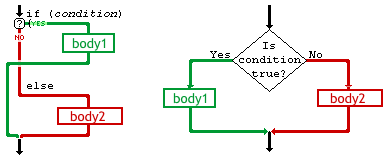Conditional statement
A conditional statement is a rule which helps to decide what to do depending on a variable value.
There are two types of conditional statements :
If (condition) then body1 else body2 :  If the condition of the operator 'if-else' is true, it passes the control to the first operator in body 1. After all operators in body 1 have been executed, it passes control to the operator that follows the operator 'if-else'. If the condition of the operator 'if-else' is false, then:
If the condition of the operator 'if-else' is true, it passes the control to the first operator in body 1. After all operators in body 1 have been executed, it passes control to the operator that follows the operator 'if-else'. If the condition of the operator 'if-else' is false, then:
- if there is the key word 'else' in the operator 'if-else', then it passes the control to the first operator in body 2. After all operators in body 2 have been executed, it passes control to the operator that follows the operator 'if-else';
- if there is no key word 'else' in the operator 'if-else', then it passes the control to the operator that follows the operator 'if-else'.
CASE (variable) OF.... : The CASE operator provides a structured equivalent to a sequence of IF... THEN... ELSE statements on the same variable.
The CASE statement is more elegant, more efficient, and easier to maintain than multiple IF.. THEN... ELSE nestings.
Example :
CASE age OF
0..3: write('Baby');
4..14 : write('child');
14..18 : write ('Teenager')
19..150 : write('Adult');
END;
Comment : In some computing languages (C, PHP, java...) the CASE statement is replaced by a SWITCH statement.